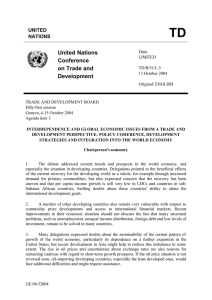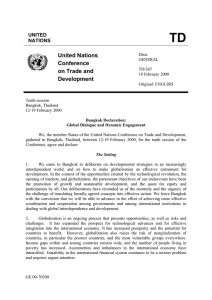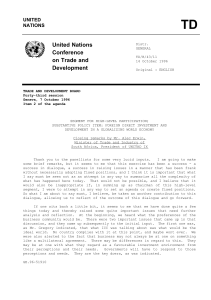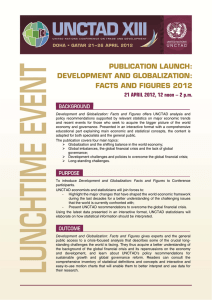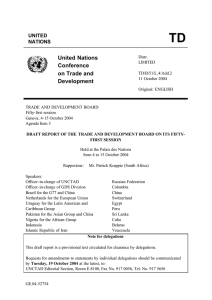TD United Nations Conference
advertisement
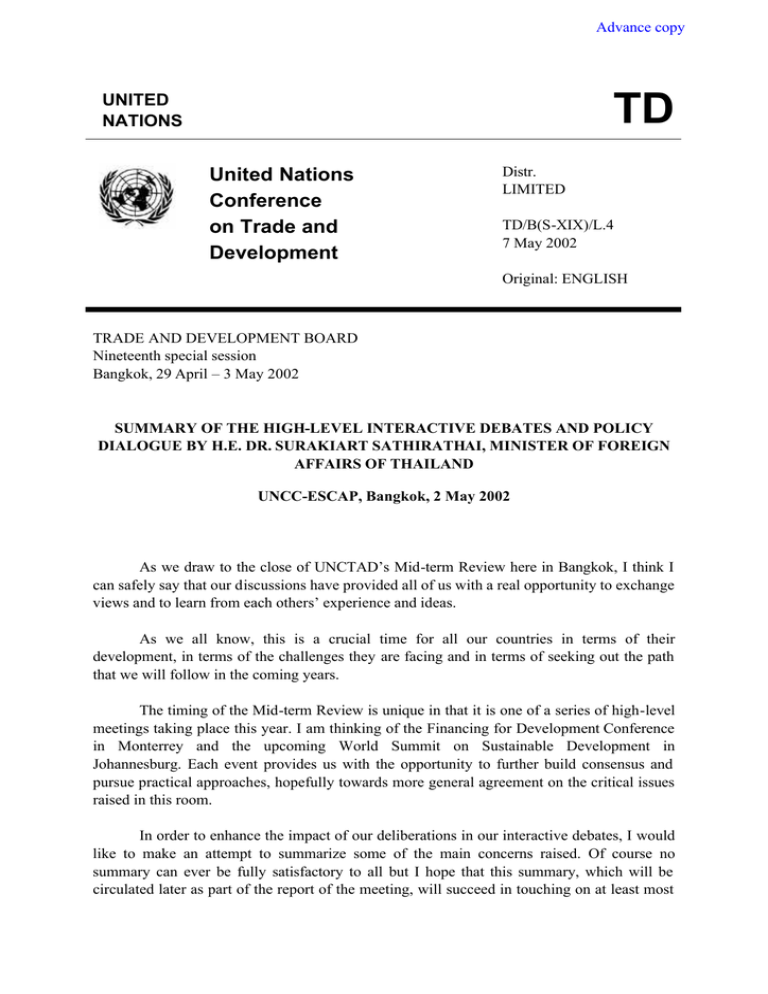
Advance copy TD UNITED NATIONS United Nations Conference on Trade and Development Distr. LIMITED TD/B(S-XIX)/L.4 7 May 2002 Original: ENGLISH TRADE AND DEVELOPMENT BOARD Nineteenth special session Bangkok, 29 April – 3 May 2002 SUMMARY OF THE HIGH-LEVEL INTERACTIVE DEBATES AND POLICY DIALOGUE BY H.E. DR. SURAKIART SATHIRATHAI, MINISTER OF FOREIGN AFFAIRS OF THAILAND UNCC-ESCAP, Bangkok, 2 May 2002 As we draw to the close of UNCTAD’s Mid-term Review here in Bangkok, I think I can safely say that our discussions have provided all of us with a real opportunity to exchange views and to learn from each others’ experience and ideas. As we all know, this is a crucial time for all our countries in terms of their development, in terms of the challenges they are facing and in terms of seeking out the path that we will follow in the coming years. The timing of the Mid-term Review is unique in that it is one of a series of high-level meetings taking place this year. I am thinking of the Financing for Development Conference in Monterrey and the upcoming World Summit on Sustainable Development in Johannesburg. Each event provides us with the opportunity to further build consensus and pursue practical approaches, hopefully towards more general agreement on the critical issues raised in this room. In order to enhance the impact of our deliberations in our interactive debates, I would like to make an attempt to summarize some of the main concerns raised. Of course no summary can ever be fully satisfactory to all but I hope that this summary, which will be circulated later as part of the report of the meeting, will succeed in touching on at least most TD/B(S-XIX)/L.4 Page 2 of the issues discussed. In my summary, I will refer to seven main areas – global trends, international trade and the multilateral trading system, financing development, enhancing supply capacities, poverty alleviation and grassroots development, governance and coherence, and finally the role of UNCTAD. Global trends At UNCTAD X, we deliberated on the risks and challenges of globalization and agreed on development strategies for an increasingly interdependent world. We concurred that globalization is an ongoing process that presents opportunities as well as risks and challenges. Rapid economic globalization, as a result of technological advancement and liberalization of international trade, finance and investment, has led to an expansion of global economic growth and development. The imbalances of the globalization process, however, also produced severe adverse effects on the development process of many less developed countries, which are unable to adjust themselves to the fast pace of globalization. The global economy has exhibited an uneven performance since then, with variations both between developed and developing countries and among developing regions. The recovery in Asia, which was already visible at UNCTAD X, has continued, but this has not been matched in much of Africa or Latin America. However, all developing countries have been vulnerable to the global slowdown, which began last year, and particularly those with strong links to the trading system. Fortunately, that slowdown has been less severe than many had feared, and there are again signs of a recovery taking place. The experience of the past two years confirms the need for a more collective approach to the economic challenges of a more integrated world. A number of international conferences since UNCTAD X have confirmed the desire to pursue such an approach, with positive outcomes registered notably at Brussels, Doha and Monterrey. There are also signs that the rich countries are more willing to support the development challenges of the weakest members of the global family of nations, for example the EU initiative on “Everything but Arms” and the promised support for the New Programme for African Development. The strong show of solidarity after the tragic events of 11 September is a further demonstration of the benefits which derive from moving in this direction. Nevertheless, the downside risks facing developing countries remain significant, as witnessed by the economic problems in Argentina. Commodity prices continue to decline and fluctuate sharply, posing grave problems for many poor commodity-dependent countries. With poverty still the big challenge for most developing countries the task facing the international community remains to strengthen the multilateral approach to development and in particular to ensure the pivotal role of the United Nations system. TD/B(S-XIX)/L.4 Page 3 International trade and the multilateral trading system Trade is an important component of development strategies, perhaps more so than in the past. Placing the development dimension, including the need to break supply constraints on exporting, at the centre of the work programme launched in Doha, stands as both a recognition of past failures and a measure of any future commitments. Translating this into practice is still surrounded by uncertainties. Many developing countries continue to struggle with the commitments made in the Uruguay Round, and implementation by developed countries has not met expectations. Moreover, protectionist trends have resurfaced in the industrial countries, and in areas, such as steel and agriculture, of direct interest to developing countries. Not surprisingly, most developing countries feel that improved market access by the major importing countries in areas of interest to developing countries is key to achieving a successful outcome to multilateral trade negotiations. In this respect, both tariff and non-tariff barriers remain a focus of their concerns. For agriculture, massive subsidies distort markets and render competition impossible for many developing countries. In light of the differences among countries in their capacity to compete on international markets, special and differential treatment also needs to be strengthened as part of the multilateral trading rules. Moreover, the accession process needs to be facilitated, particularly for LDCs. Regional trade arrangements also provide significant benefits. The interrelationship of regional arrangements with bilateral and multilateral ones is an issue to be examined. In all these areas, technical assistance for capacity building needs to be strengthened, not only to allow developing countries to participate more effectively in the negotiation process but also to enable them to benefit from the opportunities provided by the trading system. UNCTAD has a key role to play in this by pursuing the development dimension of trade negotiations, including through reinforcement of its assistance through the Integrated Framework for Trade-related Technical Assistance. Financing development Globalization means that trade can no longer be dealt with independently from finance. This was made clear at the Monterrey Conference, which adopted an integrated approach to financing for development. Over the past two decades, the integration of financial markets has seen a significant shift to private capital flows. This was expected to encourage smoother integration into the world economy, particularly by developing countries. However, in the absence of global financial arrangements to better manage their rise, increased private flows have been accompanied by increased volatility and have become a major source of contagion for economic shocks across the developing world. In moving towards new arrangements, stability of flows should be given sufficient attention. The international effort to reform the international financial TD/B(S-XIX)/L.4 Page 4 architecture needs to be strengthened to make the financial system more stable and conducive to trade and development. Financial liberalization needs to proceed cautiously and should be tailored to specific country conditions, with careful attention paid to the sequencing of reform. Furthermore, financial flows continue to be very heavily influenced by the policies of the leading industrial countries. Greater policy coherence in these countries is essential for achieving a more stable international financial environment. Unfortunately, progress in this direction has remained slow. FDI is relatively more stable than short-term private flows and it can embody technology transfer and other benefits. Private capital flows, in whatever form, have been heavily concentrated in a small number of emerging markets. In this respect, for those countries, particularly LDCs, that find it difficult to attract private inflows, measures to attract direct investment may not prove successful and instead give rise to the danger of excessive competition. Better supportive measures by home countries could contribute to addressing geographical and sectoral imbalances in FDI flows. If negotiated, international frameworks on FDI should be designed so as to service development. ODA remains key to the growth prospects of many developing countries, particularly LDCs. The Monterrey Conference heralded a welcome change of spirit among some donor countries, although new conditionalities linked to increased ODA could further marginalize some countries, if reforms are made a precondition for aid. The burden of debt continues to limit development prospects in many of these same countries, and further progress needs to be made on debt forgiveness. Lack of proper physical infrastructure remains a major obstacle to development for many developing countries. Means to finance infrastructure development need to be found. Enhancing supply capacities Trade liberalization opens up possibilities for export growth, but successful entry into import markets requires considerable improvements in supply capacity for many developing countries. For many countries, diversification is the key challenge here. Reliance on primary commodities is still an obstacle to development, particularly in LDCs and Africa, where higher value added and more processed exports are key to faster growth. Measures to deal with declining commodity prices and alleviate difficulties caused by excessive price fluctuations are called for. The knowledge gap and the digital divide comprise a major source of anxiety for policy makers in developing countries. Closing these gaps and upgrading technological capacity are necessary for taking advantage of opportunities arising from globalization. FDI can be one source of technology transfer but it has not fully met the expectations of many host countries, for example due to insufficient local linkages. TD/B(S-XIX)/L.4 Page 5 But in the end successful integration can only follow from having in place a viable domestic enterprise sector. For this, capacity building and human resource development are indispensable. In this era of globalization with increasing economic interdependence, closer economic and technical cooperation among developed and developing countries at bilateral, regional and multilateral levels is becoming a major force for economic and social development. Regional approaches and partnerships, as exemplified by the establishment of the International Institute for Trade and Development, can be effective in this respect. Poverty alleviation and grassroots development Poverty alleviation is the primary aim of development, as agreed in the Millennium Declaration. A strategy aimed at strengthening productive capacity must be people-centred, giving full recognition to the social dimension of development. To this end, initiatives to foster grassroots development, such as micro-financing, merit attention. The domestic sector must be able to benefit from increased trade. Governance and coherence The challenge facing policy makers everywhere is to make globalization work for all. This requires, first of all, domestic policies conducive to development and good governance. Coherence of macro- and micro-level policies is also important. Listening to different views of civil society may provide significant insights. With globalization, good governance at the domestic level alone is not enough. The need has become more acute for greater coherence and consistency at the multilateral level, with enhanced participation of developing countries in global decision-making. This is the case for trade, finance and investment. Role of UNCTAD UNCTAD, in accordance with the Bangkok Plan of Action adopted at UNCTAD X, should continue to act as a forum for intergovernmental discussions and deliberations and consensus building, undertake research, analysis, and data collection, and provide technical assistance tailored to the needs of the developing countries . As the focal point within the United Nations for the integrated treatment of trade and development and the interrelated issues in the area of finance, investment, technology and sustainable development, UNCTAD has clearly been mandated to carry out this very important task. All development partners and related organizations are called on to support UNCTAD in meeting the increasing demands made on it. This completes my summary. I would like to conclude by saying that it has been an honour and a pleasure for the Government and people of Thailand to host this Mid-term Review and TD/B(S-XIX)/L.4 Page 6 to receive all of you once again here in Bangkok. You all know Thailand’s devotion to the objectives of the United Nations and of UNCTAD and it is therefore particularly satisfying to give concrete expression of our support in this manner. Our goal, from the earliest stages of the preparations for this meeting, was always to provide all of us with an opportunity to come together and advance our thinking on some of the major issues on the international agenda today. I for one believe that this goal has been fully attained and my earnest hope is that you share this view. May I thank you for your participation in this meeting and wish you every success in your endeavours to promote global development benefiting everyone.


